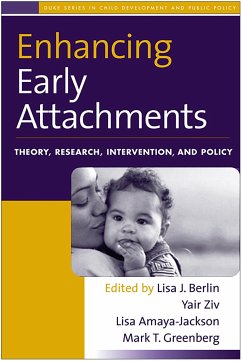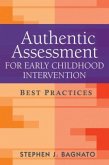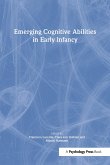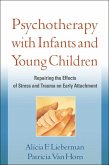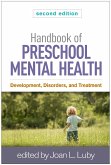Enhancing Early Attachments
Theory, Research, Intervention, and Policy
Herausgeber: Berlin, Lisa J; Greenberg, Mark T; Amaya-Jackson, Lisa; Ziv, Yair
Enhancing Early Attachments
Theory, Research, Intervention, and Policy
Herausgeber: Berlin, Lisa J; Greenberg, Mark T; Amaya-Jackson, Lisa; Ziv, Yair
- Broschiertes Buch
- Merkliste
- Auf die Merkliste
- Bewerten Bewerten
- Teilen
- Produkt teilen
- Produkterinnerung
- Produkterinnerung
Synthesizing the latest theory, research, and practices related to supporting early attachments, this volume provides a unique window into the major treatment and prevention approaches available today.
Andere Kunden interessierten sich auch für
![Enhancing Intimacy in Marriage Enhancing Intimacy in Marriage]() Dennis A BagarozziEnhancing Intimacy in Marriage66,99 €
Dennis A BagarozziEnhancing Intimacy in Marriage66,99 €![Understanding and Enhancing Positive Regard in Psychotherapy Understanding and Enhancing Positive Regard in Psychotherapy]() Barry A FarberUnderstanding and Enhancing Positive Regard in Psychotherapy63,99 €
Barry A FarberUnderstanding and Enhancing Positive Regard in Psychotherapy63,99 €![Authentic Assessment for Early Childhood Intervention Authentic Assessment for Early Childhood Intervention]() Stephen J BagnatoAuthentic Assessment for Early Childhood Intervention46,99 €
Stephen J BagnatoAuthentic Assessment for Early Childhood Intervention46,99 €![Emerging Cognitive Abilities in Early infancy Emerging Cognitive Abilities in Early infancy]() Emerging Cognitive Abilities in Early infancy60,99 €
Emerging Cognitive Abilities in Early infancy60,99 €![Psychotherapy with Infants and Young Children Psychotherapy with Infants and Young Children]() Alicia F LiebermanPsychotherapy with Infants and Young Children50,99 €
Alicia F LiebermanPsychotherapy with Infants and Young Children50,99 €![Handbook of Preschool Mental Health Handbook of Preschool Mental Health]() Handbook of Preschool Mental Health57,99 €
Handbook of Preschool Mental Health57,99 €![Promoting Student Happiness Promoting Student Happiness]() Shannon M SuldoPromoting Student Happiness46,99 €
Shannon M SuldoPromoting Student Happiness46,99 €-
-
-
Synthesizing the latest theory, research, and practices related to supporting early attachments, this volume provides a unique window into the major treatment and prevention approaches available today.
Hinweis: Dieser Artikel kann nur an eine deutsche Lieferadresse ausgeliefert werden.
Hinweis: Dieser Artikel kann nur an eine deutsche Lieferadresse ausgeliefert werden.
Produktdetails
- Produktdetails
- Verlag: Guilford Publications
- Seitenzahl: 357
- Erscheinungstermin: 9. Januar 2007
- Englisch
- Abmessung: 229mm x 153mm x 20mm
- Gewicht: 576g
- ISBN-13: 9781593854706
- ISBN-10: 1593854706
- Artikelnr.: 22279432
- Herstellerkennzeichnung
- Libri GmbH
- Europaallee 1
- 36244 Bad Hersfeld
- gpsr@libri.de
- Verlag: Guilford Publications
- Seitenzahl: 357
- Erscheinungstermin: 9. Januar 2007
- Englisch
- Abmessung: 229mm x 153mm x 20mm
- Gewicht: 576g
- ISBN-13: 9781593854706
- ISBN-10: 1593854706
- Artikelnr.: 22279432
- Herstellerkennzeichnung
- Libri GmbH
- Europaallee 1
- 36244 Bad Hersfeld
- gpsr@libri.de
Lisa J. Berlin, PhD, is a Research Scientist at the Center for Child and Family Policy at Duke University. Her work focuses on early development and programs and policies for young children and their families; she is especially concerned with child abuse prevention. Currently she is directing two studies, with funding from the National Institute of Mental Health, addressing the intergenerational transmission of problematic parenting. Yair Ziv, PhD, is a Senior Study Director at Westat. He has conducted research on attachment-based early intervention and on parent-child relationships in infancy, childhood, and adolescence. Dr. Ziv's research program focuses on cognitive models of self and others and the mechanisms through which these models guide social perception, information processing, and behavior in close relationships. Lisa Amaya-Jackson, MD, MPH, is Associate Professor in Psychiatry and Behavioral Sciences at Duke University Medical Center. She is Associate Director at the UCLA-Duke National Center for Child Traumatic Stress and Co-Director of Research and Training at the Center for Child and Family Health in North Carolina. Dr. Amaya-Jackson is a clinician-researcher known for her research in the assessment and treatment of children exposed to traumatic life events and her expertise in implementing evidence-based treatment for child trauma in community settings. Mark T. Greenberg, PhD, is Emeritus Professor in the College of Health and Human Development at The Pennsylvania State University, where he is also Founding Director of the Edna Bennett Pierce Prevention Research Center. A developmental psychologist, Dr. Greenberg is the author of over 350 journal articles and book chapters on the development of well-being; learning; and the effects of prevention efforts on children and families. He is a Founding Board Member of the Collaborative for Academic, Social, and Emotional Learning (CASEL). Dr. Greenberg is the recipient of numerous awards, including the Urie Bronfenbrenner Award for Lifetime Contribution to Developmental Psychology in the Service of Science and Society from the American Psychological Association. One of his current interests is how to help nurture awareness and compassion in our society. He is Chairperson of the Board of CREATE, a nonprofit devoted to improving the quality of schooling and the lives of teachers and students.
I. Theoretical and Research Bases for Interventions to Enhance Early
Attachments
1. Interventions to Enhance Early Attachments: The State of the Field
Today, Lisa J. Berlin
2. Examination of the Precursors of Infant Attachment Security:
Implications for Early Intervention and Intervention Research, Jude
Cassidy, Susan S. Woodhouse, Glen Cooper, Kent Hoffman, Bert Powell, and
Mindy Rodenberg
3. Attachment-Based Intervention Programs: Implications for Attachment
Theory and Research, Yair Ziv
4. The Developmental Neurobiology of Disrupted Attachment: Lessons from
Animal Models and Child Abuse Research, Frank W. Putnam
5. Reciprocal Influences of Attachment and Trauma: Using a Dual Lens in the
Assessment and Treatment of Infants, Toddlers, and Preschoolers, Alicia F.
Lieberman and Lisa Amaya-Jackson
II. Interventions to Enhance Early Attachments: Practice and Policy
6. The Circle of Security Intervention: Differential Diagnosis and
Differential Treatment, Glen Cooper, Kent Hoffman, Bert Powell, and Robert
Marvin
7. Minding the Baby: Enhancing Parental Reflective Functioning in a
Nursing/Mental Health Home Visiting Program, Arietta Slade, Lois S. Sadler,
and Linda C. Mayes
8. Attachment and Biobehavioral Catch-Up: An Intervention Targeting
Empirically Identified Needs of Foster Infants, Mary Dozier, Oliver
Lindhiem, and John P. Ackerman
9. Building Attachment Relationships Following Maltreatment and Severe
Deprivation, Charles H. Zeanah and Anna T. Smyke
10. The NurseâEUR"Family Partnership: Foundations in Attachment Theory and
Epidemiology, David L. Olds
11. Enhancing Early Attachments in the Context of Early Head Start: Can
Programs Emphasizing Family Support Improve Rates of Secure
InfantâEUR"Mother Attachments in Low-Income Families?, Susan Spieker, Dana
Nelson, Michelle DeKlyen, and Fredi Staerkel
12. Tales From the Capitol: Tried, True, and Not-True Strategies for
Increasing Policy Support for Programs to Enhance Early Attachment,
Geoffrey Nagle and Joan Wightkin
âEUR¢ Commentaries
1. Why Less Is More: From the Dodo Bird Verdict to Evidence-Based
Interventions on Sensitivity and Early Attachments, Marinus van IJzendoorn,
Marian J. Bakermans-Kranenburg, and Femmie Juffer
2. Models versus Metaphors in Translating Attachment Theory to the Clinic
and Community, Thomas G. O'Connor and Wendy L. Nilsen
3. Enhancing Early Attachments: Synthesis and Recommendations for Research,
Practice, and Policy, Mark T. Greenberg
Attachments
1. Interventions to Enhance Early Attachments: The State of the Field
Today, Lisa J. Berlin
2. Examination of the Precursors of Infant Attachment Security:
Implications for Early Intervention and Intervention Research, Jude
Cassidy, Susan S. Woodhouse, Glen Cooper, Kent Hoffman, Bert Powell, and
Mindy Rodenberg
3. Attachment-Based Intervention Programs: Implications for Attachment
Theory and Research, Yair Ziv
4. The Developmental Neurobiology of Disrupted Attachment: Lessons from
Animal Models and Child Abuse Research, Frank W. Putnam
5. Reciprocal Influences of Attachment and Trauma: Using a Dual Lens in the
Assessment and Treatment of Infants, Toddlers, and Preschoolers, Alicia F.
Lieberman and Lisa Amaya-Jackson
II. Interventions to Enhance Early Attachments: Practice and Policy
6. The Circle of Security Intervention: Differential Diagnosis and
Differential Treatment, Glen Cooper, Kent Hoffman, Bert Powell, and Robert
Marvin
7. Minding the Baby: Enhancing Parental Reflective Functioning in a
Nursing/Mental Health Home Visiting Program, Arietta Slade, Lois S. Sadler,
and Linda C. Mayes
8. Attachment and Biobehavioral Catch-Up: An Intervention Targeting
Empirically Identified Needs of Foster Infants, Mary Dozier, Oliver
Lindhiem, and John P. Ackerman
9. Building Attachment Relationships Following Maltreatment and Severe
Deprivation, Charles H. Zeanah and Anna T. Smyke
10. The NurseâEUR"Family Partnership: Foundations in Attachment Theory and
Epidemiology, David L. Olds
11. Enhancing Early Attachments in the Context of Early Head Start: Can
Programs Emphasizing Family Support Improve Rates of Secure
InfantâEUR"Mother Attachments in Low-Income Families?, Susan Spieker, Dana
Nelson, Michelle DeKlyen, and Fredi Staerkel
12. Tales From the Capitol: Tried, True, and Not-True Strategies for
Increasing Policy Support for Programs to Enhance Early Attachment,
Geoffrey Nagle and Joan Wightkin
âEUR¢ Commentaries
1. Why Less Is More: From the Dodo Bird Verdict to Evidence-Based
Interventions on Sensitivity and Early Attachments, Marinus van IJzendoorn,
Marian J. Bakermans-Kranenburg, and Femmie Juffer
2. Models versus Metaphors in Translating Attachment Theory to the Clinic
and Community, Thomas G. O'Connor and Wendy L. Nilsen
3. Enhancing Early Attachments: Synthesis and Recommendations for Research,
Practice, and Policy, Mark T. Greenberg
I. Theoretical and Research Bases for Interventions to Enhance Early
Attachments
1. Interventions to Enhance Early Attachments: The State of the Field
Today, Lisa J. Berlin
2. Examination of the Precursors of Infant Attachment Security:
Implications for Early Intervention and Intervention Research, Jude
Cassidy, Susan S. Woodhouse, Glen Cooper, Kent Hoffman, Bert Powell, and
Mindy Rodenberg
3. Attachment-Based Intervention Programs: Implications for Attachment
Theory and Research, Yair Ziv
4. The Developmental Neurobiology of Disrupted Attachment: Lessons from
Animal Models and Child Abuse Research, Frank W. Putnam
5. Reciprocal Influences of Attachment and Trauma: Using a Dual Lens in the
Assessment and Treatment of Infants, Toddlers, and Preschoolers, Alicia F.
Lieberman and Lisa Amaya-Jackson
II. Interventions to Enhance Early Attachments: Practice and Policy
6. The Circle of Security Intervention: Differential Diagnosis and
Differential Treatment, Glen Cooper, Kent Hoffman, Bert Powell, and Robert
Marvin
7. Minding the Baby: Enhancing Parental Reflective Functioning in a
Nursing/Mental Health Home Visiting Program, Arietta Slade, Lois S. Sadler,
and Linda C. Mayes
8. Attachment and Biobehavioral Catch-Up: An Intervention Targeting
Empirically Identified Needs of Foster Infants, Mary Dozier, Oliver
Lindhiem, and John P. Ackerman
9. Building Attachment Relationships Following Maltreatment and Severe
Deprivation, Charles H. Zeanah and Anna T. Smyke
10. The NurseâEUR"Family Partnership: Foundations in Attachment Theory and
Epidemiology, David L. Olds
11. Enhancing Early Attachments in the Context of Early Head Start: Can
Programs Emphasizing Family Support Improve Rates of Secure
InfantâEUR"Mother Attachments in Low-Income Families?, Susan Spieker, Dana
Nelson, Michelle DeKlyen, and Fredi Staerkel
12. Tales From the Capitol: Tried, True, and Not-True Strategies for
Increasing Policy Support for Programs to Enhance Early Attachment,
Geoffrey Nagle and Joan Wightkin
âEUR¢ Commentaries
1. Why Less Is More: From the Dodo Bird Verdict to Evidence-Based
Interventions on Sensitivity and Early Attachments, Marinus van IJzendoorn,
Marian J. Bakermans-Kranenburg, and Femmie Juffer
2. Models versus Metaphors in Translating Attachment Theory to the Clinic
and Community, Thomas G. O'Connor and Wendy L. Nilsen
3. Enhancing Early Attachments: Synthesis and Recommendations for Research,
Practice, and Policy, Mark T. Greenberg
Attachments
1. Interventions to Enhance Early Attachments: The State of the Field
Today, Lisa J. Berlin
2. Examination of the Precursors of Infant Attachment Security:
Implications for Early Intervention and Intervention Research, Jude
Cassidy, Susan S. Woodhouse, Glen Cooper, Kent Hoffman, Bert Powell, and
Mindy Rodenberg
3. Attachment-Based Intervention Programs: Implications for Attachment
Theory and Research, Yair Ziv
4. The Developmental Neurobiology of Disrupted Attachment: Lessons from
Animal Models and Child Abuse Research, Frank W. Putnam
5. Reciprocal Influences of Attachment and Trauma: Using a Dual Lens in the
Assessment and Treatment of Infants, Toddlers, and Preschoolers, Alicia F.
Lieberman and Lisa Amaya-Jackson
II. Interventions to Enhance Early Attachments: Practice and Policy
6. The Circle of Security Intervention: Differential Diagnosis and
Differential Treatment, Glen Cooper, Kent Hoffman, Bert Powell, and Robert
Marvin
7. Minding the Baby: Enhancing Parental Reflective Functioning in a
Nursing/Mental Health Home Visiting Program, Arietta Slade, Lois S. Sadler,
and Linda C. Mayes
8. Attachment and Biobehavioral Catch-Up: An Intervention Targeting
Empirically Identified Needs of Foster Infants, Mary Dozier, Oliver
Lindhiem, and John P. Ackerman
9. Building Attachment Relationships Following Maltreatment and Severe
Deprivation, Charles H. Zeanah and Anna T. Smyke
10. The NurseâEUR"Family Partnership: Foundations in Attachment Theory and
Epidemiology, David L. Olds
11. Enhancing Early Attachments in the Context of Early Head Start: Can
Programs Emphasizing Family Support Improve Rates of Secure
InfantâEUR"Mother Attachments in Low-Income Families?, Susan Spieker, Dana
Nelson, Michelle DeKlyen, and Fredi Staerkel
12. Tales From the Capitol: Tried, True, and Not-True Strategies for
Increasing Policy Support for Programs to Enhance Early Attachment,
Geoffrey Nagle and Joan Wightkin
âEUR¢ Commentaries
1. Why Less Is More: From the Dodo Bird Verdict to Evidence-Based
Interventions on Sensitivity and Early Attachments, Marinus van IJzendoorn,
Marian J. Bakermans-Kranenburg, and Femmie Juffer
2. Models versus Metaphors in Translating Attachment Theory to the Clinic
and Community, Thomas G. O'Connor and Wendy L. Nilsen
3. Enhancing Early Attachments: Synthesis and Recommendations for Research,
Practice, and Policy, Mark T. Greenberg

